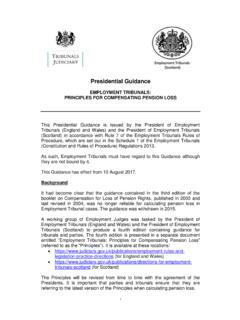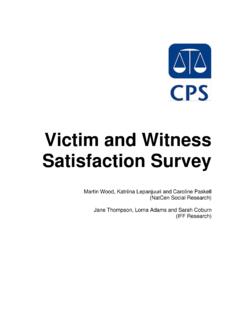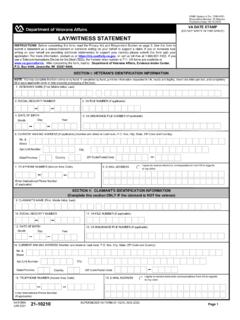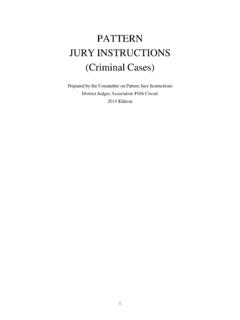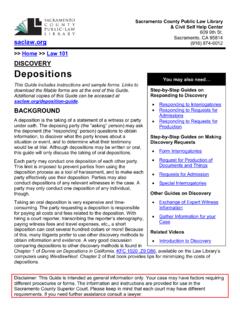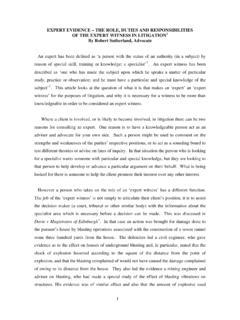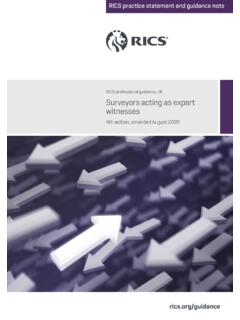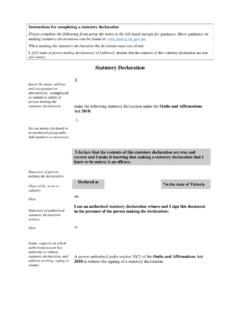Transcription of Practice Direction 57AC (Witness Evidence at Trial)
1 Practice Direction 57AC ( witness Evidence at Trial) 1. General This Practice Direction is made under rule It concerns witness statements for use at trials in the Business and Property Courts and applies to new and existing proceedings, but only to trial witness statements signed on or after 6 April 2021. For the avoidance of doubt, nothing in this Practice Direction affects (1) affidavit Evidence , (2) Evidence in a witness statement other than a trial witness statement, or (3) the general powers of the court under rule , to control, exclude or limit factual witness Evidence .
2 (Rule provides for Evidence in proceedings other than at trial; rule provides where Evidence may or must be given in the form of an affidavit.) In this Practice Direction (including the Appendix) relevant court guide means any of the court guides referred to by paragraph of Practice Direction 57AA that is applicable to the proceedings, relevant legal representative means, in relation to a trial witness statement, a legal representative authorised to conduct litigation who has had responsibility for ensuring that the purpose and proper content of trial witness statements and proper Practice in relation to their preparation have been explained to and understood by the witness (and legal representative has the meaning given in rule ), trial means a final trial hearing, whether of all issues or of only one or some particular issues, in proceedings (except as provided in paragraph below)
3 In any of the Business and Property Courts under CPR Part 7 or Part 8 or upon an unfair prejudice petition under section 994 of the Companies Act 2006 or a contributory s just and equitable winding up petition under section 122(1)(g) of the Insolvency Act 1986, trial witness statement means a witness statement that is served pursuant to an order made under rule (2), or pursuant to rule or an order made under rule (1)(b), or that is prepared for the trial of an unfair prejudice petition or a contributory s just and equitable winding up petition, including supplemental or reply witness statements where allowed by the court, and relevant party means the party by or on behalf of whom the witness statement is served (and for the avoidance of doubt includes a party who is also a witness .)
4 As regards their own trial witness statement). (Rule (2) requires the court to order service of witness statements for use at trials; rules and provide for the service and use of written witness Evidence in proceedings under Part 8.) This Practice Direction does not apply to the following proceedings, unless the court at any stage directs that it is to apply: (1) an application under Part VII of the Financial Service and Markets Act 2000 for an order sanctioning an insurance business transfer scheme, a banking business transfer scheme, a reclaim fund business transfer scheme or a ring-fencing transfer scheme.
5 (2) an application under Part XXV of the Financial Services and Markets Act 2000 for an injunction or restitution in connection with contravention of relevant requirements, as defined in that Act; (3) an application for an order under the Insolvency Act 1986 (other than a contributory s just and equitable winding up petition under (1)(g) of that Act), under the Insolvency (England and Wales) Rules 2016, under any enactment or statutory instrument providing for a special insolvency or administration regime, and under Schedule 2 to The Cross-Border Insolvency Regulations 2006.
6 (4) a claim made under the Companies Act 2006 listed in Part II of Practice Direction 49A of the Civil Procedure Rules (whether in relation to limited companies or limited liability partnerships), an application for an order under Part 26A of that Act, a claim to restore a company to the register under section 1029 of that Act and a claim under Council Regulation (EC) No 2157/2001 listed in Part III of Practice Direction 49A; (5) an application under Part II of The Companies (Cross-Border Mergers) Regulations 2007.
7 (6) proceedings falling within CPR Part 57, which applies to probate claims, claims for the rectification of wills, claims to substitute or remove a personal representative, and claims under the Inheritance (Provision for Family Dependants) Act 1975, the Presumption of Death Act 2013 and the Guardianship (Missing Persons) Act 2017; (7) proceedings in the Intellectual Property Enterprise Court falling within Section V of Practice Direction 63; (8) proceedings under CPR Part 64, which applies to certain claims relating to the administration of estates of deceased persons or trusts (Section I of Part 64), and to charity proceedings (Section II of Part 64); (9) proceedings in the Technology and Construction Court relating to adjudication awards under Section 9 of the TCC Guide.
8 If a rule or other Practice Direction requires some matter to be stated in a witness statement that will be a trial witness statement, that requirement still applies In the event of inconsistency between this Practice Direction and any other Practice Direction the provisions of this Practice Direction shall prevail. 2. The purpose of a trial witness statement The purpose of a trial witness statement is to set out in writing the Evidence in chief that a witness of fact would give if they were allowed to give oral Evidence at trial without having provided the statement.
9 (Rule (1)(a) provides that in general any fact which needs to be proved at trial by the Evidence of witnesses is to be proved by their oral Evidence given in public, and rule (1) defines a witness statement as a signed statement containing the Evidence the witness would be allowed to give orally.) Trial witness statements are important in informing the parties and the court of the Evidence a party intends to rely on at trial. Their use promotes the overriding objective by helping the court to deal with cases justly, efficiently and at proportionate cost, including by helping to put parties on an equal footing, saving time at trial and promoting settlement in advance of trial.
10 (The overriding objective is defined in rule ) 3. The content of witness statements A trial witness statement must contain only (1) Evidence as to matters of fact that need to be proved at trial by the Evidence of witnesses in relation to one or more of the issues of fact to be decided at trial, and (2) the Evidence as to such matters that the witness would be asked by the relevant party to give, and the witness would be allowed to give, in Evidence in chief if they were called to give oral Evidence at trial and rule (2) did not apply.


